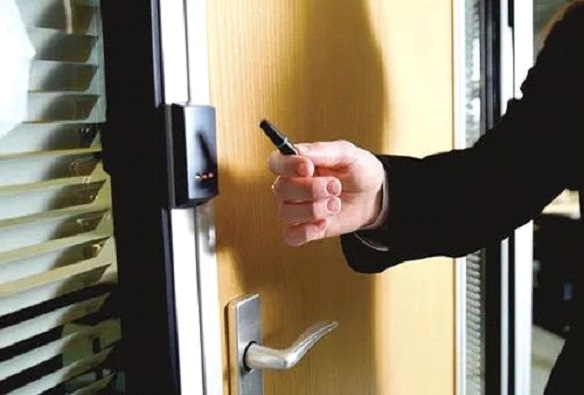HOW TO IMPLEMENT AN ACCESS CONTROL SYSTEM IN YOUR BUSINESS?

In the contemporary and dynamic business environment, the utmost importance has been placed on security. In light of the proliferation of technological innovations, conventional lock and key systems have become inadequate in protecting commercial establishments. Access control system companies in Abu Dhabi are leaders in delivering these solutions, thereby enabling organisations to fortify their locations efficiently. This blog explores the four primary stages involved in the implementation of access control systems, emphasising their criticality in the context of contemporary business security.
Which Access Control System Do I Need?
-
Fobs, key cards
Businesses nationwide utilise key cards and fobs. These are cheap and easy to use, but they're not as secure as current ones. That doesn't mean key cards are useless. They can be trustworthy and cost-effective for smaller enterprises without pricey stock or data. Two-factor authentication with a key card or fob makes it tougher for trespassers to break in without setting off an alarm.
For large organisations, creating access control cards or fobs for each user is costly. If you fit this criteria, consider a cheaper, more current option. - Control Biometric
Paxton biometrics eliminates the need for physical credentials. Fingerprints, facial scans, and DNA are biometrics. These are all becoming more popular in business.
Biometric technology has developed 35.1% faster than other security technologies since 2018. This is because biometrics are more secure than prior credentials. They cannot be lost and are harder to clone than key fobs or access cards. Biometric access control ensures each credential works for one person. - Mobile Credentials
Another option is mobile credentials. These are smart investments for most workplaces, regardless of size. These are convenient and controlled by secure smartphone apps on registered devices. This allows staff and inhabitants to enter the facility with a button.
Most equipment has biometric control, so you wouldn't need a phone to break into the building. Entering the phone requires their credentials—two-factor authentication. This setup makes mobile credentials a secure access control method.
Steps for implementation of access control system
-
Evaluation and Strategy
Each successful security strategy commences with a comprehensive evaluation of the premises. In the access control system suppliers in UAE work closely with organisations to determine their specific security requirements. A number of factors are assessed during this phase, including the facility's layout, entry and departure points, high-security areas, and employee count. This evaluation facilitates the identification of weaknesses and the development of an individualised access control solution.
During the planning phase, appropriate access control mechanisms are chosen in accordance with the assessment. Key cards, biometric scanners, PIN codes, and even cutting-edge technologies such as facial recognition are examples. This stage is crucial for access control system suppliers in UAE that are in search of an intercom system provider in order to seamlessly incorporate intercom functionalities into their access control strategy. - Execution
After the evaluation and preparation stages have been finalised, the execution stage commences. The implementation of selected access control systems characterises this phase. Biometric information is gathered from employees via key cards or access credentials, and intercom systems are strategically positioned. Access control system suppliers in UAE carry out this stage with accuracy, thereby minimising business interruption.
Integrating the selected intercom system during the implementation phase is critical for bolstering security. Intercom systems augment the verification process by facilitating communication between personnel and visitors prior to issuing access. Organisations have the ability to communicate with visitors, verify their identification, and grant access authorization all from a centralised location. - Management and Monitoring
Real-time monitoring and administration of the access control systems constitutes the third phase. Advanced technology enables organisations to monitor and document each entry and exit. This surveillance system offers an all-encompassing view of personnel movements and aids in detecting atypical behaviours. Access control system companies in Abu Dhabi provide advanced software that enables organisations to remotely administer permissions. An example of this is the ability to deactivate a lost key card by an employee, thereby thwarting unauthorised access.
Additionally, intercom systems are vital during this phase. Through two-way communication with visitors, organisations can guarantee that only authorised personnel gain access. Increased security measures may be implemented to scrutinise or deny access to individuals who are deemed suspicious. - Upgrades and Maintenance
The concluding stage entails the upkeep and regular enhancement of the access control systems. Similar to the constant evolution of technology, security hazards also endure. Access control system companies in Abu Dhabi perform routine maintenance to guarantee the systems' optimal operation. Prompt resolution of any faults or vulnerabilities is imperative in order to uphold a superior standard of security.
It is critical to implement upgrades in order to address potential intrusions proactively. As organisations gain access to more sophisticated systems and novel functionalities, they have the ability to bolster their security protocols. This is specifically pertinent to intercom systems, given that the incorporation of novel communication technologies can result in enhanced visitor authentication and more streamlined correspondence.
Maintenance and upgrades, assessment and planning, implementation, monitoring and management, and implementation comprise the four primary phases that provide businesses with a comprehensive framework for establishing robust security measures.
These stages illustrate the progression of enterprises from access control system companies in Abu Dhabi —from the initial evaluation to a completely integrated and adaptable security framework. Additionally, the incorporation of intercom systems into this framework strengthens the access control strategy by facilitating visitor administration and introducing an additional level of scrutiny.
By seeking the guidance of specialised access control system companies in Abu Dhabi and investing in an appropriate access control solution, organisations can enhance their ability to safeguard their interests amidst a dynamic threat environment. By acknowledging the importance of each stage and the function of intercom systems, organisations can make well-informed choices regarding the establishment of a secure setting for their activities.


